Nautical idioms and sailing terms
From “A1 condition” to “Bolster“, nautical idioms have enriched our language…
151. A1 condition
If something is “A1” it is in excellent condition. For example: “Smithies bought a new apartment which was in A1 condition…”
It stems from 1760 when Lloyd’s of London inspected merchant’s vessels in order to rate them in terms of their seaworthiness and general condition. Naturally, A1 was the highest rating…
152. Zig-Zag
A sailing vessel needs to tack into the prevailing winds in order to make headway. This is synonymous with zig-zagging. Now use more broadly we can say that “The skier zig-zagged down the mountain.
153. Canteen medals
Canteen medals is an old Naval term for having stains down the front of your shirt which was caused by spilling food or drink. Today we can say that “After feeding, the baby was wearing a fair amount of canteen medals which were quickly cleaned by mom…”
154. He hasn't got a clue
There are normally three ends od a sail being the head, the tack and the clew. The clew is attached to the sheets that control the sail so if it fails the sail will not only be useless, it will also become uncontrollable and dangerous: clueless. In order to rectify this situation, the sheets need to be “clued up: again.
In today’s language, if someone “hasn’t got a clue” then they are ignorant about something. You can “get clued up” to rectify this ignorance.
155. That's a balls up
That project was a total balls up. Ie, a disaster. A well-used idiom in today’s language.
It originates from the day of sailing ships where “balls” (and other shapes) were hoisted into the rigging to communicate all types of issues. Even today under the Colregs 3 balls up means the vessel is aground.

156. Give me some slack
The meaning has not changed much over the years but started where sailors were tasked to hoist cargo on board sailing ships. This was done with pullies and ropes and often by 2 or more sailors. They would alternate the effort and when requiring a break would ask for some slack (on their rope) with the weight of the cargo held by the other. Today, it means exactly that: give me a break.
157. Loose lips sink ships
During WWII, the War Advertising Council put out posters to make people aware that their general conversations could be overheard by German sympathisers. A simple discussion about your husband returning on a specific day and time gave spies the intelligence that was then passed on to the Germans who would act by laying in wait for the ship’s arrival for the purpose of sinking it.
Today we mean to say that anything you say may be used against you.
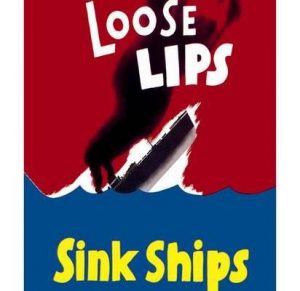
158. Please mind your P's and Q's
Today we use this idiom to make sure that someone behaves in a manner acceptable for the occasion.
However, “mind your P’s and Q’s” was originally used to record sailor’s beer tabs. Pints and quart were recorded by the bartender until such time the sailor got paid. It was therefore easy to overspend so sailors needed to mind their P’s and Q’s…
159. Round robin
In sport, we have round robins meaning that all participants will play all other participants and the one with the most points wins the competition. (As opposed to a sudden dead type competition such as the Australian Tennis Open.)
It stems from mariners that were extremely unhappy with the ship’s captain and served him with a piece of paper called a round robin which had on it all the names of the crew that supported the complaint. However, the names were written in a circle so the captain could not determine who the leader was.
160. Drifting through life
Being adrift in maritime terms means that you are at the mercy of the wind and currents.
Today we may describe someone without any purpose in life to be a drifter: someone without a permenent home or steady job.
161. To bear down
During naval battles, an attacking ship will try to bear down on an enemy ship meaning it had the wind behind her resulting in the ship increasing speed and therefore manoeuvrability. It gave her a better opportunity to come alongside the enemy ship and deliver her firepower.
Today, when we “bear down” we exert a concentrated effort on a person using authority and swift action.
162. Blood Money
When we think of today’s meaning of blood money we may refer to a financial gain at the expense of someone. It could be a price paid to a hired killer. Compensation paid to the family of the victim of a murder or perhaps the most famous example of blood money the thirty pieces of silver paid to Judas…
It stems from maritime origin but there are 2 schools of thought about where exactly it originated from.
- The money received by those recruiting crew for the navies of the world were said to be paid in blood money. This was because most of the recruiting techniques were unconscionable at best. (See “Shanghaing“, press into service and “bottoms up“.)
- Others claim it to be the reward privateers received for the capture or sinking of enemy ships.

163. All sewn up
Today we use this idiom to express that something is all done and completed.
In the age of sailing ships, there was no refrigeration and therefore sailors that died on the voyage needed to receive their burial at sea. The crew would roll the dead sailor in his hammock which was weighted down by some heavy objects so it would sink. The hammock was then sewn closed (all sewn up) and the body committed to the sea.
Interestingly, the last stitch when sewing up the hammock was through the nose of the dead sailor: just to ensure he was indeed dead…
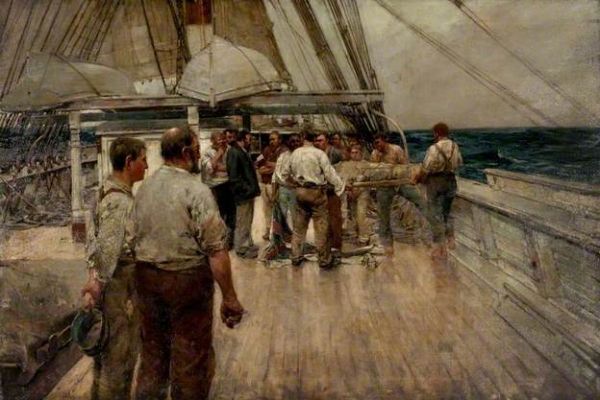
164. Putting a new slant on things
In sailing the slant is the angle of the vessel or pitch. Most vessels have an optimal slant which becomes important when racing. There are also arguably different slants for different conditions so we can see that sailors would try to put a different slant on the vessel in the prevailing conditions to improve her speed.
Today we use the idiom to mean changing the way we see things or looking at things from a different perspective.
165. Whipping boy
To be the whipping boy means that you are blamed or punished for the faults or incompetence of others. For example, “If this project fails, Smithies will be made the whipping boy because management will never take responsibility…”
In sailing, whipping means the protection of the end of a rope to prevent fraying. It is both a knot and a method. In essence, a twine is wrapped around the end of a larger rope. It was a very junior task. When done incorrectly the junior sailor would, at today’s standards, be severely punished.
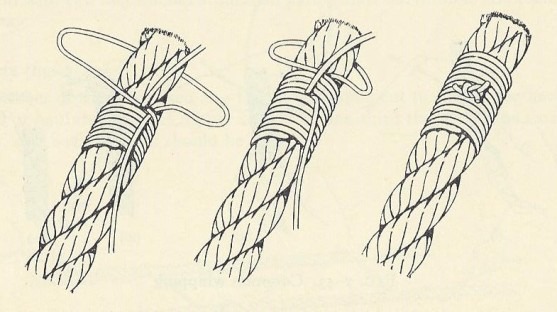
166. Perks (perquisites)
Naval officers had a relatively small salary which was subsidised by perks (short for perquisites). This could be a percentage of the spoils of war or any benefits either in money or in kind.
In today’s language, it is used outside the navy in any situation where one stands to receive a benefit. For example, if you work in a clothing store you will enjoy perks such as free or heavily discounted clothing.
167. An Albatross around your neck
To have an Albatross around your neck is synonymous with an annoying burden. You can say: “This useless dingy is an Albatross around my neck.” We all know an Albatross is a large sea bird.
However, sailors in the 1600s believed that the Albatross was an embodiment of dead sailors. Chasing an Albatross of the deck or killing one was considered bad luck. I guess not dissimilar to cows in some parts of India.
168. Going Dutch
Going Dutch means sharing the expenses of what could often be a dinner. In today’s world, a first date may decide to go Dutch so there is no expectation of post-meal activities. It is a considered and conscious decision based on fairness and equality.
Not so in the 17th centuries were English and the Dutch were constantly at war over trade routes. The English considered the Dutch a stingy bunch and coined the phrase “going Dutch” with a negative connotation.

169. Go the whole nine yards
Today we use the idiom “the whole nine yards” relatively often. We want to express that whatever we are talking about was complete, comprehensive and includes everything.
The expression stems from the era of square-riggers. These ships had 3 masts and often carries 3 yards (smain sails) on each mast disregarding sky and moon sails etc… Hence, when all mainsails were up it would give you the full 9 yards. This provided maximum speed and manoeuvrability and was all that the ship had to offer.
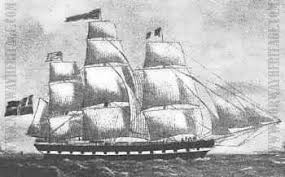
170. Go with the flow
A very commonly used idiom which is self-evident in terms of its origin. Specifically in the age of sail, but also relevant in today’s shipping industry, going with the flow of the tides made the voyage quicker as well as more comfortable.
Today we say go with the flow to because we suggesting to relax and take the path of least resistance. For example: “Don’t worry about tomorrow’s stocktake: just go with the flow and it will work itself out…”
171. Start with a clean slate
Old sailing ships use to record their movement on a slate. This included things like the ship’s course, tags made, the speed where applicable and other information that was recorded during the watch. When the watch was released, all information was handed over to the new watch. Subsequent to analysing the data, the slate was wiped clean in order to record relevant data of the new watch. Ie, it was used as an aid to a handover brief.
Today, when we wipe the slate clean and start with a clean slate we are meaning to say that there is a new beginning without passed issues being forgotten. For example: “Smithies did really badly on his knot tying test last year but the captain offered him another opportunity by letting him start with a clean slate…”
172. What a cock-up
When the old sailing ships came into port, space was of the essence. Any spars (wooden poles like yards, booms, bowsprit etc…) that were positioned outside the breath of the ship needed to be secured so they would not stick out impeding other ships or cranes and equipment on the dock. This was referred to as cocking up the spars” and was a process that was carried out most times a ship came into port.
Today, a cock-up is something that is done wrong or badly. For example: “Smithies handed over the stocktake figures to the captain. After having a quick look over the numbers, the captain shook his head and declared both the stocktake, and Smithies personally, as a total cock-up…””
173. The sun is over the yardarm
Okay, you want a beer but it is a bit early. You can say “it 5 o’clock somewhere in the world” or make similar excuses. The sun is over the yardarm is just one more excuse to start drinking earlier than is socially excepted…
It possibly originates from the habits of Officers in the Navy. If the sun would rise above the most upper spar, it was time for morning tea (read rum break). When analysing this, we could say that this may occur between 10 am to 11 am. Cheers!
174. Having a field day
Having a field day may mean just going to spend some time in the field: like a school excursion. As an idiom, and more likely, it is a great time or a great deal to do, at somebody else’s expense. For example: “Smithies had a field day after discovering that the captain’s wife filed for divorce…”
The expression arguably came from maritime maintenance where a workday was designated for the maintenance or cleaning of ship’s equipment and stores.
175. Armed to the teeth
Being armed to the teeth originates from the Caribean in the age of piracy. Having a flintlock pistol as his main weapon was an issue as it could only be fired once. Naturally, a pirate could carry many loaded flintlock pistols but eventually, he would need something else. Whilst using his pistols, a pirate would carry his knife in between his teeth so he could have easy and instant access to it as well as looking rather intimidating.
Today, we use the idiom to denote that someone is well-armed either literally or sometimes figuratively.
For example: “When Smithies entered the courtroom he was well prepared and armed to the teeth with rebuttals…”
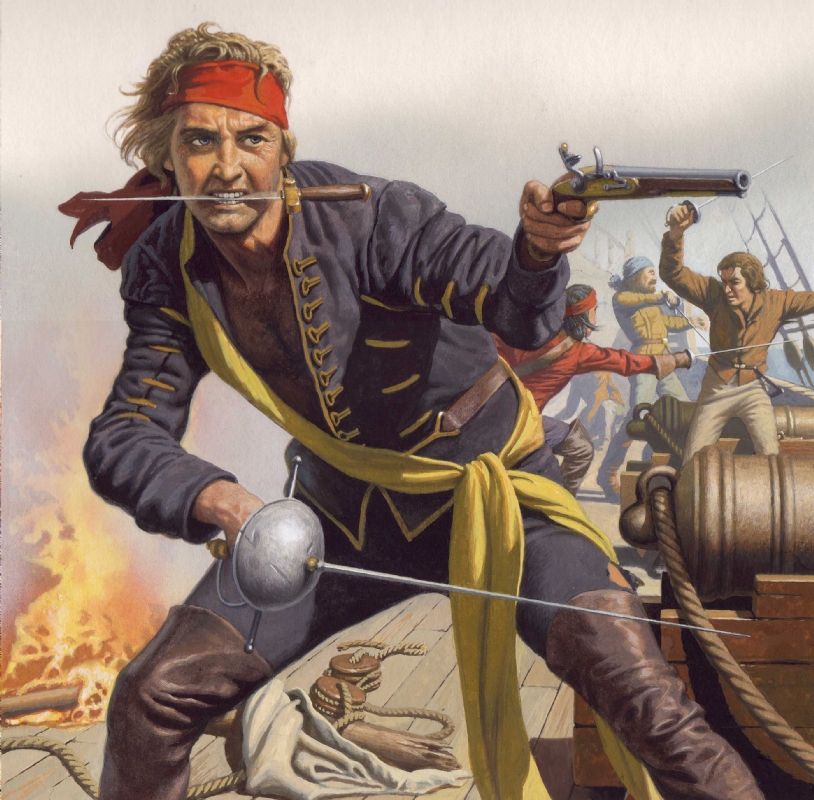
176. At a rate of knots
“Smithies is travelling at a great rate of knots in his new Porsche”. A well-used idiom to express that something is going fast. Literally, the greater the rate of knots by a ship, the more nautical miles it will travel per hour.
177. Bamboozle
It was common practice for pirates in the late 1600s and early 1700s to fly a nation’s flag in order for them to approach other ships without suspicion. At the last minute, the pirates would hoist the Jolly Roger to strike fear into the heaths of their unsuspecting victims.
Bamboozling in today’s language means simply to fool or trick someone. For example: “When the magician turned over the Queen of Spades the audience looked bamboozled…”
See also “Showing her true colours“.
178. Fudging the books
Once upon a time (the introduction of this idiom should alert you to its validity), there was a Captain called Fudge. There are in fact records of the existence of a Captain Fudge in the late 1700s. However, from here the tale loses some credibility as it pronounces Captain Fudge to be a bit of a “creative accountant” and a pathological liar. It is said that the good Captain would off-load some of the ship’s cargo in France with proceeds going into his own pockets. Then manipulating the books to show that there was no cargo missing.
Now, we just mean to say that something is put together dishonestly.
179. Getting hitched
A hitch is a means by which a rope is made fast and stems from the 1760s and is without a doubt nautical.
There are several types of high knot including a cow hitch and a more simple clove hitch.
Now we describe the act of marriage as getting hitched.
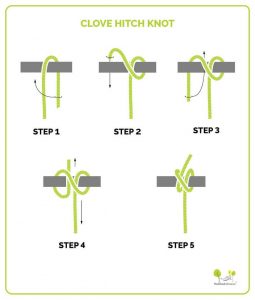
180. Barging in
As we know, a barge is a vessel with a flat bottom which at best is a bit hard to manoeuvre. They are often large with a momentum that is not easy to stop. Barges are not elegant ships with great lines but clumsy floating containers…
You “barge in” if you suddenly and rudely interrupt or disturb someone. For example: “I’m happy to listen to you but don’t barge in right now…”

181. Stranded
Figuratively, you can be stranded when you get stuck, left helpless and without the means to move from somewhere. For example: “Smithies picked up a hitchhiker who seemed stranded at the side of the road…”
The word originates from the Dutch word “strand” meaning beach. Being stranded was no more than your ship running aground on a beach.
Related: Marooned
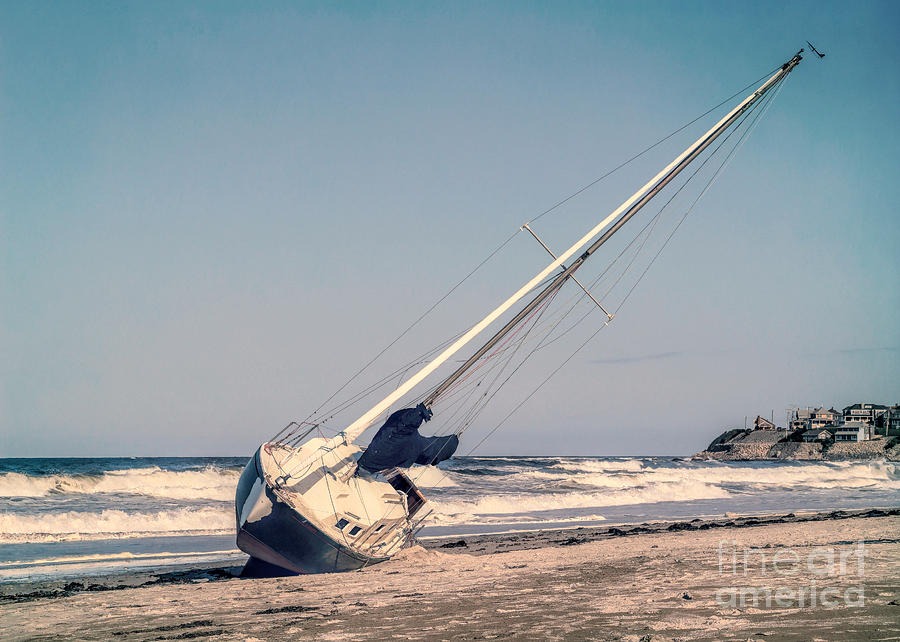
182. Take someone down a peg or two
There are 2 potential origins of this idiom but both stemming from maritime practices.
- We mentioned the scuttlebutt before to describe the barrel on board a sailing ship in which the drinking water was stored. Water was sometimes rationed and each sailor was given a number of pegs: a unit of volume. IIf a sailor did something wrong he may be punished by reducing his ration of drinking water.
- It is also argued that the flag signalling system sits at the core of this well-used idiom. The colours where raised using pegs and the colours were only taken down as a sign of surrendering which must be the low point of the battle.
Using the idiom today, we mean to imply that someone needs to realise that they have less talented or important than they may think they are. For example: “When Smithies declared that he could be a great leader, the captain took him down a peg or two reminding him of the last time he was in charge of the sloop…”
183. There she blows...
There it is! We say “there see blows” sometimes to announce the arrival of something that we anticipated for a long time. For example: “When Smithies wife asked for an additional allowance, he hailed there she blows…”
Originally, it was the whaler in the crow’s nest that hailed “Thar she blows…” when spotting a spout of water making the crew below aware that a whale was nearby to be hunted down and killed for its oil.
184. Marooned
It became common practice in the early 1700s to punish someone by way of abandonment on a small deserted island. That person would more often than not be the (ex) captain after a mutiny.
Today we simply mean to say that someone or something is stranded.
185. Leading light
When approaching a harbour or port, there is often a narrow channel that needs to be navigated. In order to assist sailors, two lights were placed one behind the other.
If the ship was on a course the two lights lined up and it was assured it was in the centre of the channel and safe from running aground.
We now use “leading light” to point out a leader or someone that inspires us…

186. Bigwigs
Don’t act like you are a bigwig. In other words, stop pretending you more important than you are. An idiom with negative connotations which derives its meaning from early 18th-century dress code by the elite within the Royal Navy.
It seems, the higher the rank and the more substantial the wealth; the bigger the wig. Sailors referred to these high ranking officers, which often simply purchased their commission, as bigwigs and were very much disliked by all other ranks.
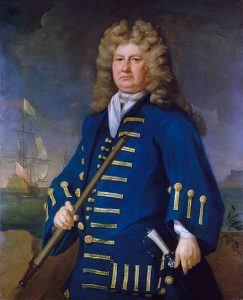
187. In the black books
In the time of Edward III of England in the early 1300s, there existed a volume of law which contained admiralty rules. It was a collection of maritime laws and conduct and was known as the Black Books of the Admiralty.
It governed some of the punishments of the time which were cruel and inhumane at best.
Today, if you are in someone’s black books it will mean that you are out of favour with someone. For example: “Smithies was in the Captain’s blank book when he steered the ship 60-degree off-course…”

188. Careen
We use the word careen or careening to indicate that someone is driving a vehicle recklessly and in the worst case getting the vehicle on two wheels… “The go-cart careened around the corner…”
It stems from the French carener and was simply a method of performing maintenance on ship hulls by laying the ship on its side assisted by the low tide. The ship was sailed to a careenage at high tide and when the tide receded, the ship’s hull would be exposed and work could commence.
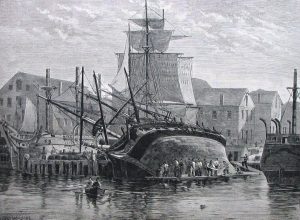
189. Calm before the storm
Sailors were the first to understand the meteorological conditions of storms. They knew instinctively and through experience, that warm moist air is pulled into a storm system which leaves a low-pressure vacuum at its front. This low-pressure system is the calm a ship would find itself in before the high pressure would hit.
Today we say “calm before the storm” when we expect something to change from smooth to chaotic. For example: “When Smithies started to babysit the twins, they were asleep but he knew that was just the calm before the storm…”

190. Come up through the hawse-pipe
There were two ways of receiving a commission as an officer in the British Navy. Usually, the wealthier families could simply purchase a commission at any rank or go through the appropriate channels entering the officer’s career path and working their way up within the commissioned ranks. A third way to become an officer was to “come up through the hawse-pipe” meaning that you started as a simply deckhand, worked your way up through the non-commissioned ranks and then finally made the change from non-commissioned officer to a commissioned officer.
In today’s language, we can say that someone came up through the hawse-pipe were the individual climbed the corporate ladder from the very bottom. For example: “The editor of the Post Newspaper came up through the hawse-pipe, starting his career as a copy boy and working his way up…”

191. Dismantle
Originally, a naval term to strip a ship from its rigging, equipment and fortifications.
Today, when we dismantle something we take a thing apart.
192. Chewing the fat
A sailor’s rations were not a culinary smorgasbord of fresh produce. Fresh meat was an issue due to the lack of refrigeration so low-quality pork or beef was often dried and salted to preserve it. A kind of jerky is you like. It was consumed more often than not below deck when the sailors had some spare time. The social setting combined the consumption of dried meat with the telling of tall tales. Hence, today we use “chewing the fat” where we have a casual conversation, some gossip or other verbalisation of what goes on in the world. For example: “When Smithies caught up with his mate Billie, they chewed the fat until the early hours…”
193. Fend off
We still fend off when we are trying to avoid our vessel from running into other vessels or the jetty. In order to do this, we can make use of several fenders.
We also use it as an idiom to distance or defend ourselves from both verbal and physical attack.
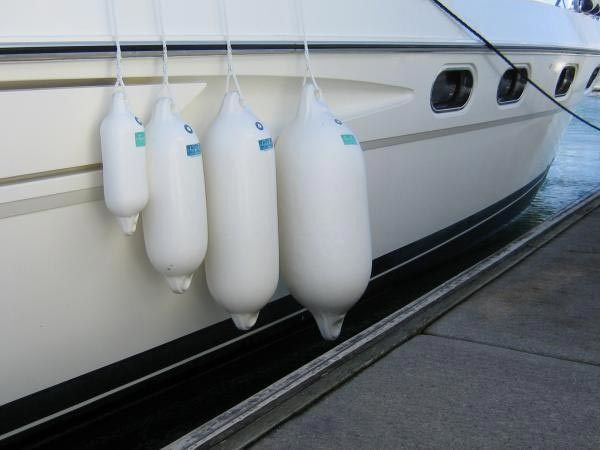
194. Swashbuckler
Swashbuckler and buccaneer are often used synonymously especially in Hollywood movies. In essence, they show a pirate (either licenced by a Government or not) with a good hard such as Jack Sparrow.
The term “Swashbuckler” has changed a bit over the years and mellowed it’s meaning from a negative to a more endearing one. One that seeks adventure…
We can use it today to say for example: “Price Phillip’s reply was no less than a swashbuckler’s retort…”

195. Sound off
To gauge the depth of the water, sailors used a swinging the lead. They used a rope with knots denoting the depth of the water. They would shout out the depth to the officer in charge often at the aft of the ship. This was called “sounding off”.
Today, we sound off if we express our opinions in a brash and/or vigorous manner.
196. Any port in a storm
PROVERB: in adverse circumstances, one welcomes any source of relief or escape.
Stems from sailors sailing to the nearest port when a storm was developing.
197. Crew Cut
The “Crew cut” is precisely what it promises: a very short hairstyle given to the crew of a ship.
It further developed in the 1940s where reference is made to the term “crew cut” chosen as the preferred hairstyle by boat crews of Harvard and Yale universities.
Today we just mean to say a very short cut and often referred to as a “number 1”.

198. Cup of Joe
A cup of Joe stems from American Navy folklore. In 1913, President Woodrow Wilson appointed Josephus Daniels (Joe) as Secretary of the Navy. Not long after his appointment, and to the horror of the officers, “Joe” Daniels abolished the long-standing tradition of serving alcohol on ships. This was known as “general Order 99”.
From that point onwards, a cup of coffee was the strongest beverage available and hence, a cup of coffee became synonymous with a cup of Joe…
The idiom quickly spread through the rest of the defence force.

199. Blood is thicker than water
When we say “blood is thicker than water” we mean to say that we value our family relationships above anything else. For example: “When the captain’s son was given the promotion over Smithies, it was clear that blood will always be thicker than water…”
The earliest mention of this can be found in the German language in the late-1100s (blut ist dicker als wasser) but really entered our language in the late 1800s after Josiah Tattnall, a U.S. Navy Commodore, decided to go against the U.S. policy of neutrality when he witnessed the British being attacked at Taku Forts at the mouth of the Pei Ho River. Tattnall clearly saw the British as kin more so than the Chinese.
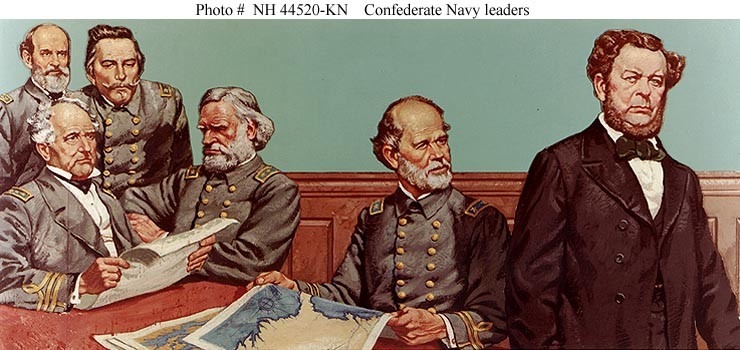
200. Bolster
A bolster is a piece of wood applied in many places on wooden sailing ships. They are designed to prevent chafing. It can also be a piece of softwood installed on the trestle-trees to prevent them from getting nipped by the rigging.
Today we use the word bolster to mean “support” or “strengthen”. For example: “After the captain died, Smithies tried to bolster the crew’s morale by volunteering to act in the position of captain. If anything did bolster morale, it was the laughter that followed…”
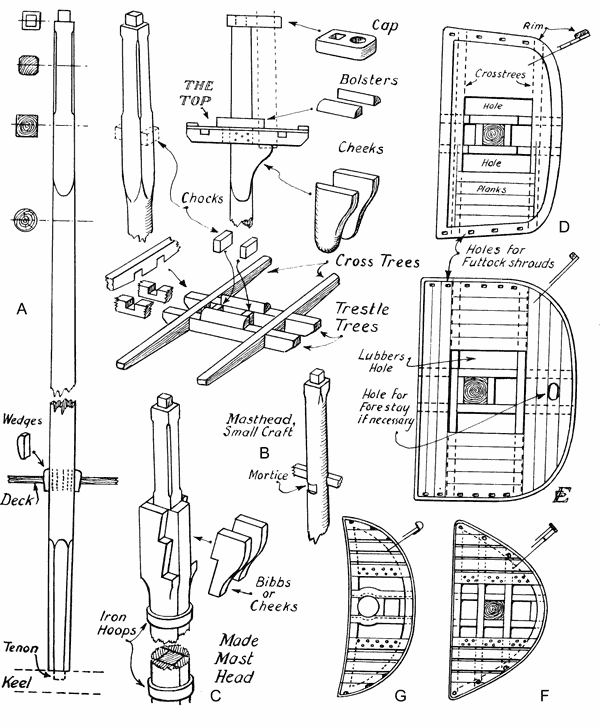
Do you know any other idioms?
If you have any idioms, expressions or sayings that you think have their origin in sailing or maritime in general then let us know by commenting below. Let’s make this the most comprehensive “sailing did you know” list around…
If you feel there are mistakes in the above idioms then don’t hesitate to say…
Pingback: 200 Nautical Terms and Sailing Phrases That Have Enriched The English Language - Tall Tell Tales
Pingback: Nautical idioms and sailing terms 201-250 - Tall Tell Tales
Pingback: Nautical idioms and sailing terms 101 -150 - Tall Tell Tales
Pingback: Nautical idioms and sailing terms 51 -100 - Tall Tell Tales